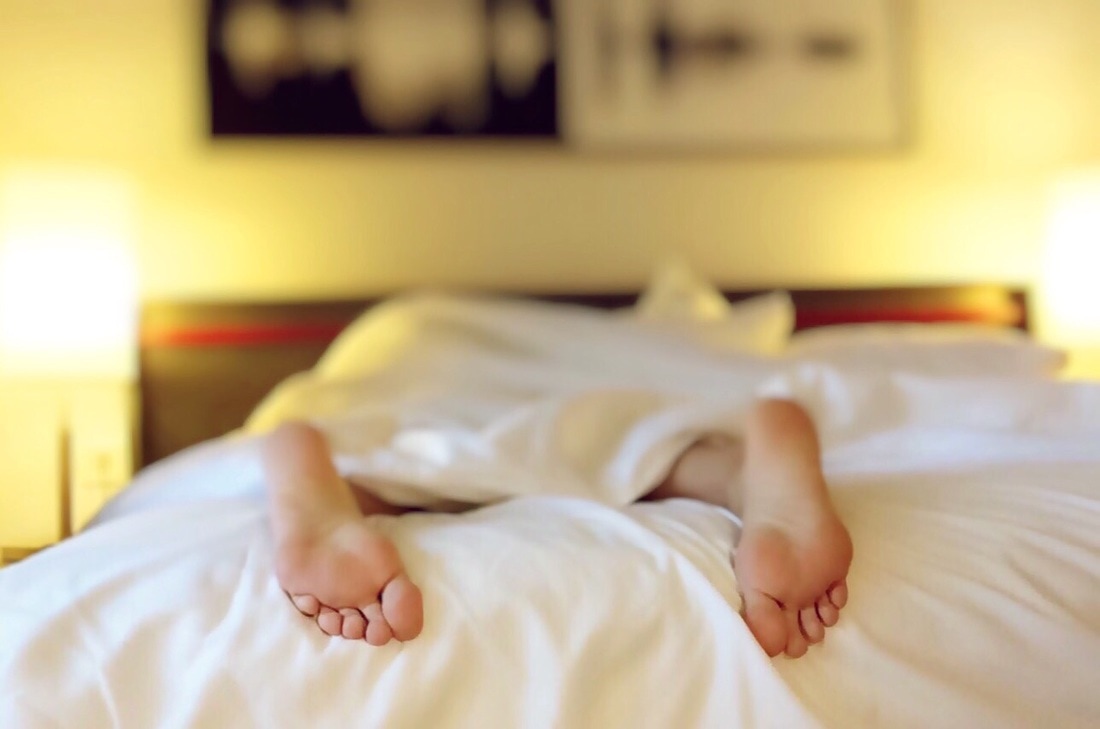
As an acupuncturist, one of the most common complaints I get in my office is problems with sleep; difficulty falling asleep, problems staying asleep, waking up at a specific time or waking too early.
Anyone that has had a sleep problem knows what a big impact it has on all aspects of life. Poor sleep affects your mood, concentration, and productivity. Pain will be worse. Insufficient sleep has been linked long term to high blood pressure, heart disease and diabetes. All of these problems then seep into deteriorating personal and professional relationships. Because of the whole life impact poor sleep has, I add acupuncture points to ease sleep on nearly every patient I see.
The amount of sleep a person needs varies throughout life. Newborns need the most, with adults needing the least. The recommendation for adults is 7-8 hours of sleep a night, while nearly 30% of the population get only 6 hours or less. The elderly still need the same amount as younger adults, but their patterns shift to shorter and lighter chunks.
If you see your MD about sleep, you may be given advice on ways to improve your environment for sleep, a prescription sleep aid, or possibly a supplement recommendation. If you bring your sleep woes to an acupuncturist, we will look at things differently depending on the type of sleep problem you are having.
We look at the body systems in a more organic, whole body way and we concern ourselves not just with the physical function of the organ, but also with the “energetic” function of the organ systems. When I’m speaking to my patients about the energetics of an organ, to keep the confusion down, I jokingly refer to it as their Chinese organ. To keep this straight when writing, I capitalize the organ name when I’m referring to a energetic aspect versus a physical aspect.
Difficulty Falling Asleep - People with this kind of insomnia will toss and turn. We often look at this as an excess condition involving the Liver and Gall Bladder. In Chinese medicine, these two organ systems are responsible for the smooth flow of qi, our energy. In this situation the “excess” is like a stream that has overrun its banks, disturbing the smooth flow of the stream.
Difficulty Staying Asleep - This type of insomnia is usually a deficient condition. Sometimes they can go right back to sleep and sometimes they may be up for hours, or not get back to sleep at all. We view this as a deficiency involving Spleen and Heart. I’ve had personal experience with this type of insomnia. I went through a phase after having kids where I could fall asleep no problem, but would be wide awake 20 minutes later. Turns out I was anemic. In Chinese medicine, the Spleen and Heart are both involved with the control of the blood and blood vessels.
Dream Disturbed Sleep - This can be two different problems depending on the way it is expressed. Nightmares generally involve the Gall Bladder, while repetitive dreams, or even being unable to shut the mind off is more of a Spleen and Heart imbalance. In the Chinese way of thinking, the Spleen and Heart are connected to the mind and thought.
Waking at a Specific Time of Night - This is probably the most common type of sleep disturbance I see in my patients.. More often than not people wake up between 3 and 5 am, the liver time in Chinese medicine. This is a problem of stagnation of the flow of energy, or from a western perspective, blood and oxygen. There is often an emotional component, frustration, anger or stress.
That is all fine and good, but now what? Your treatment will involve a session(s) of acupuncture designed to address your specific imbalance. In general even people who don’t come in for sleep disorders will sleep better after acupuncture. Most of my patients even doze on the table! Love me a great nap with needles acu-snooze!!!
But, acupuncture isn’t the only thing an acupuncturist can do to help with sleep. In addition to diet and lifestyle changes, I also recommend Chinese herbal formulas. They are rarely given as a single herb that you might find on the shelves of the local market, instead they are a combination of herbs combined to work synergistically. Chinese herbal formulas are also different than a traditional sleep aid. They are designed to address a specific imbalance, and depending on the form of the herb, can be customised for each individual and they are not habit forming. There are several different Chinese herbal formulas that are helpful for sleep and each mix is designed for a specific imbalance.
I also like to give my patients ways they can help themselves. I might recommend a stretch, a tea or a supplement. A copy of blood work can be helpful, and in the case of insomnia, it can pinpoint some easy to fix areas. Common causes of insomnia that show up in blood work are thyroid problems, low B vitamins, iron deficiency anemia and hormone imbalances.
Finally, some self care things you can do to improve your sleep.
Exercise - Move your body every day. A well worked body is a tired body. However don’t exercise too vigorously before bed or it can have the opposite effect.
Diet - Try to leave 2-4 hours between your last meal and bedtime. Avoid stimulants like caffeine before bed. Some sources say that a glass of wine before bed can be relaxing, but for the most part, no alcohol before bed is a better bet. Our liver is most active at night cleaning things up and our modern lifestyle exposes us to lots of toxins that it needs to take care of. It’s best not to overburden it any more than we already do. A cup of herbal tea before bed can be relaxing and one that supports liver function, such as dandelion root, can help the liver with its job.
Environment - Avoid electronics for at least 30 minutes before bed, this includes your cellphone. Get rid of light in the blue/green spectrum in your room. Reduce as many light and sound sources as you can. I cover my red clock with a pillow when I go to sleep. A bedtime ritual of yoga or meditation can go a long way to help slow your mind and get it ready to shut down for the night. There are lots of Youtube channels you can check out for free yoga and meditation - just do it at least 30 minutes before you go to sleep!
Routine - Set yourself a regular schedule for sleep and stick to it, even on the weekend. Aim to hit the sack by 10 or 11 every night. If you work a swing shift or nights, it is still important to set a schedule. Your body will get used to the idea of a bed time, and start looking forward to it. Don’t let your phone, TV shows, work throw you off... or even a good book (guilty!). They will still be there when you wake up, and you can better enjoy them if you are well rested.
Poor sleep is frustrating. It makes everything more difficult. Sometimes it’s out of your control - when you don’t feel well, the kids wake up, or you have noisy neighbors. For the most part, there is hope and it doesn’t have to be of the pharmaceutical variety. Acupuncture, herbs or supplements, and small diet and lifestyle can naturally make a big change in quality of sleep.

 RSS Feed
RSS Feed